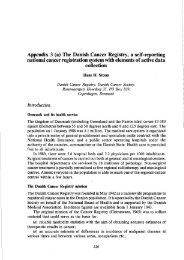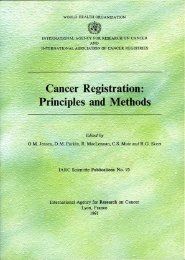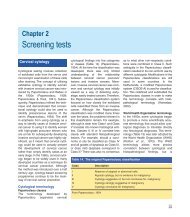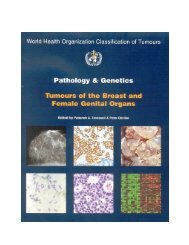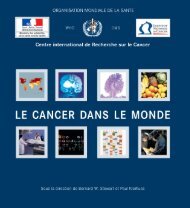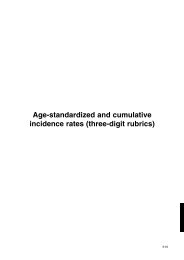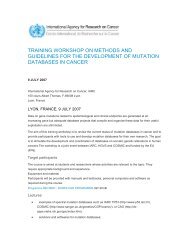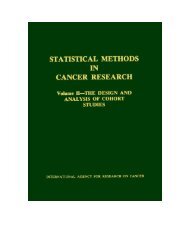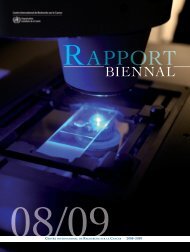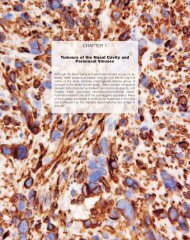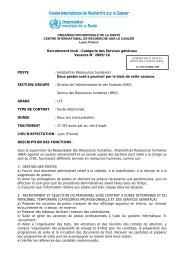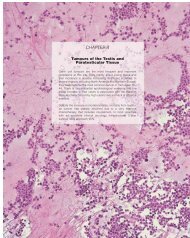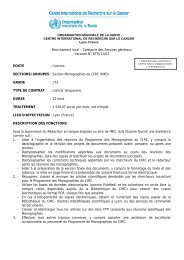world cancer report - iarc
world cancer report - iarc
world cancer report - iarc
Create successful ePaper yourself
Turn your PDF publications into a flip-book with our unique Google optimized e-Paper software.
Fig. 5.30 A diet rich in fresh fruit and vegetables<br />
is associated with a lower risk of colorectal <strong>cancer</strong>.<br />
LKB1<br />
DPC 4<br />
PTEN<br />
?<br />
NORMAL<br />
EPITHELIUM<br />
p53<br />
PEUTZ-JEGHER SYNDROME<br />
JUVENILE POLYPOSIS SYNDROME<br />
HEREDITARY MIXED POLYPOSIS SYNDROME<br />
COWDEN SYNDROME<br />
1p<br />
poor in vegetables and fibre is associated<br />
with an increased risk of colorectal <strong>cancer</strong>.<br />
Alcohol intake and smoking (for<br />
polyps only) have also been suggested to<br />
increase risk. Conversely, a low fat, high<br />
vegetable and possibly high fibre diet has<br />
a protective effect. Persons with an<br />
increased intake of vitamin D and calcium<br />
have a reduced risk of colon <strong>cancer</strong> [4].<br />
Physical activity is also protective. The<br />
chronic use of non-steroidal anti-inflammatory<br />
drugs (NSAIDs) and aspirin is<br />
associated with a significant risk reduction<br />
in certain groups [5] (Chemoprevention,<br />
p151). It has also been suggested<br />
that use of hormone replacement therapy<br />
in postmenopausal women may decrease<br />
the risk of colon <strong>cancer</strong>.<br />
Conditions that predispose to the development<br />
of colorectal <strong>cancer</strong> include<br />
inflammatory bowel disease and Crohn<br />
disease [4]. Patients who have had previous<br />
malignant disease are also at a<br />
greater risk of developing a second colorectal<br />
tumour.<br />
EARLY<br />
INTERMEDIATE SMAD 4 LATE<br />
APC<br />
CTNNB1<br />
ADENOMA KRAS ADENOMA SMAD 2<br />
DCC<br />
ADENOMA p53<br />
Aneuploidy<br />
METAPLASTIC<br />
POLYP<br />
FLAT<br />
ADENOMA<br />
Hypomethylation<br />
BCL 2<br />
C MYC<br />
?<br />
LOW GRADE<br />
DYSPLASIA<br />
EARLY MHAP/<br />
SERRATED<br />
ADENOMA<br />
? progression<br />
Familial<br />
PMS2<br />
PMS1<br />
MLH1<br />
MSH2<br />
GTBP<br />
δ polymerase<br />
HIGH GRADE<br />
DYSPLASIA<br />
INTERMEDIATE<br />
ADENOMA<br />
FLAT<br />
CANCER<br />
LATE RER+<br />
ADENOMA<br />
LATE<br />
ADENOMA<br />
Detection<br />
Bleeding is a common symptom of<br />
advanced <strong>cancer</strong>. Diarrhoea suggests a<br />
right-sided tumour and constipation or<br />
occlusion suggests a left-sided tumour.<br />
However, premalignant lesions (adenomatous<br />
polyps) and <strong>cancer</strong> limited to the<br />
mucosa and submucosa are asymptomatic<br />
as a rule. Thus screening is now proposed<br />
for healthy people, with a view to <strong>cancer</strong><br />
prevention (Screening for colorectal <strong>cancer</strong>,<br />
p163). Appropriate populations for<br />
screening may be those at an average risk<br />
who are above the age of 50, or individuals<br />
selected by a risk factor questionnaire<br />
(which may also be used to search for other<br />
cases in the family of the person examined).<br />
Should the questionnaire findings be<br />
positive, the risk is increased 2.5 fold for<br />
that individual. The questionnaire is included<br />
in the assessment of patients with sporadic<br />
colorectal <strong>cancer</strong>. It also aims to<br />
detect genetic syndromes, transmitted in a<br />
dominant autosomal fashion, which are<br />
much less frequent than sporadic <strong>cancer</strong>.<br />
SPORADIC<br />
CANCER<br />
ULCERATIVE COLITIS-<br />
ASSOCIATED COLORECTAL<br />
CARCINOMA<br />
SPORADIC<br />
CANCER<br />
RER+<br />
CANCER<br />
Fig. 5.31 Putative genetic pathways in colorectal <strong>cancer</strong>. It is thought that the majority of tumours develop according to the original Vogelstein model (bold<br />
arrows). See Multistage carcinogenesis, p 84. MHAP=Mixed hyperplastic adenomatous polyps.<br />
Sporadic<br />
Hypermethylation<br />
TGFBR2<br />
IGFIIR<br />
BAX<br />
E2F4<br />
p15<br />
p16<br />
Bub1<br />
cyclin D1<br />
7q<br />
17q<br />
14q<br />
22q<br />
8p<br />
tPa<br />
CEA<br />
nm23<br />
MMP<br />
E-cadherin<br />
CD44<br />
Colorectal <strong>cancer</strong> 199



